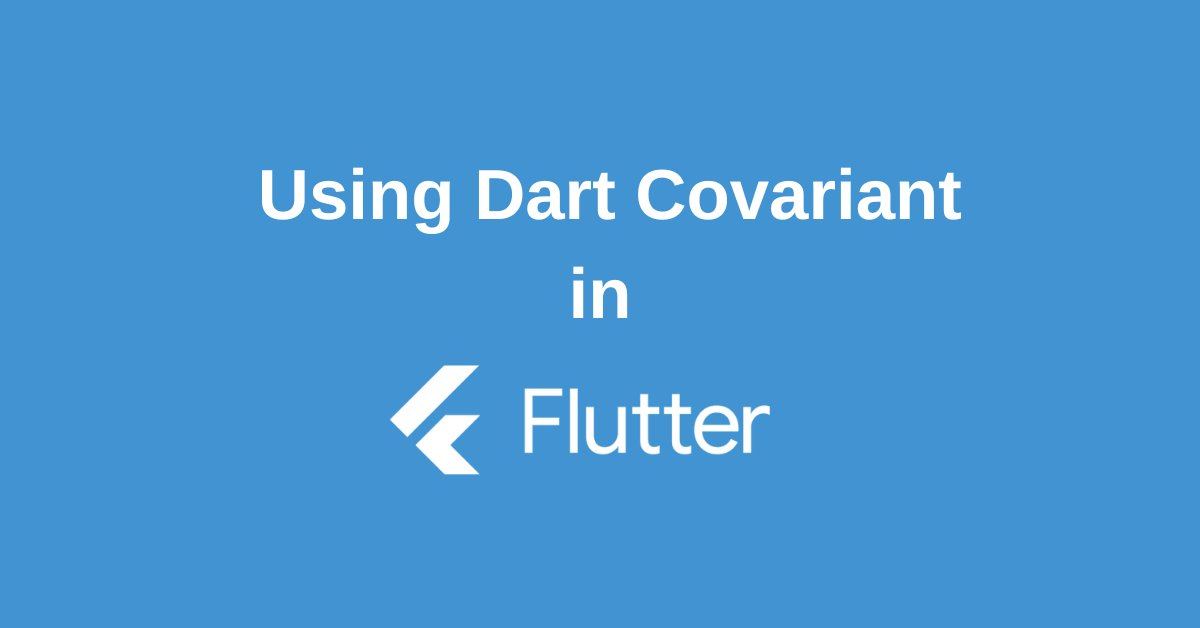Dart, Google’s programming language for building modern applications, offers a powerful feature known as covariance. Covariant allows you to assign a subtype to a supertype variable, enabling more flexible and expressive code. In the context of Flutter development, understanding and effectively utilizing covariance can significantly enhance your ability to create robust and efficient applications.
This blog post will delve into the intricacies of Dart covariance, exploring its definition, benefits, and practical applications within Flutter. By mastering covariance, you’ll be equipped to write cleaner, more maintainable, and type-safe Flutter code.
The Dart Covariant Keyword
While Dart’s covariant keyword can be complex, it offers significant functional benefits. Primarily, it ensures type safety, a cornerstone of robust programming. Covariance allows method parameters to be modified when a method is overridden, enabling the acceptance of arguments of a different type.
Dart Covariant Keyword: The Syntax
The syntax of the Dart covariant keyword is simple and straightforward. You append covariant to the variable you intend to modify with the covariant keyword.
class Animal {
void chase(covariant Animal animal) {
// Animal chasing code here
}
}
class Mouse extends Animal {}
class Cat extends Animal {
void chase(covariant Mouse mouse) {
// Cat chasing mouse code
}
}
This code sample illustrates an animal shelter where the chase method from class Animal is overridden in class Cat to accept Mouse type.
Typically, this would generate an error because Mouse is a stronger type compared to Animal. However, the Dart covariant keyword makes this possible without any compile-time error.
Understanding the Covariant Keyword’s Usage
Dart’s covariant keyword is primarily used when overriding a parent class method and accepting different parameter types. It ensures type safety and prevents exceptions.
In the provided code, without covariant, a static error would occur. Replacing a weaker type (Animal) with a stronger type (Mouse) in the chase method raises a potential risk. Covariance addresses this, allowing the code to compile and run correctly.
Behaviors with Covariant Parameters
Understanding how parameters behave when marked with the Dart covariant keyword is fundamental for utilizing its full potential. Let’s explore an instance.
abstract class Animal {
void chase(Animal animal);
}
class Mouse extends Animal {
void chase(Mouse mouse) {
// Chasing a mouse
}
}
class Cat extends Animal {
void chase(covariant Mouse mouse) {
// Chasing a mouse
}
}
In the code above, the chase method in the Mouse class can’t override the chase method in the Animal class since it doesn’t have the covariant keyword. Meanwhile, the Cat class version of chase can override the Animal class’s method, courtesy of the Dart covariant keyword.
Covariant Keyword and Variable Overriding
Covariance isn’t limited to method overriding; it also addresses variable overriding. When a variable override leads to a static error, the covariant keyword can be used as a solution.
class Animal {
Animal child;
}
class Cat extends Animal {
@override
covariant Cat child;
}
In this example, overriding the child variable of the Animal class with a Cat type in the Cat class would traditionally raise a static error. But with our Dart keyword ‘covariant’, the error is out of the picture, permitting successful variable overriding.
Wrangling with Warnings: Covariant and Static Checking
When marked with the covariant keyword, parameters get their static types disregarded during static checking. This leads to no static errors but can result in runtime errors if we’re not careful. Hence, an understanding of static warnings associated with covariant becomes a necessary part of coding.
Advanced Techniques Using The Dart Covariant Keyword
The Dart covariant keyword takes your Flutter programming up a level. Let’s explore a few advanced programming techniques involving this keyword.
Method Overriding and Covariant
While a Dart method can be overridden in a subclass, specific conditions must be met, such as matching parameter data types. When these conditions conflict with Dart’s type system, the covariant keyword can be used to address the issue
class Animal {
void addFriend(covariant Animal friend) {}
}
class Cat extends Animal {
@override
void addFriend(Cat friend) {}
}
This example shows a Cat class overriding the addFriend() method declared in the Animal class. It allows substituting a subclass (Cat) for the superclass (Animal). Without the Dart Covariant keyword, this would lead to a static error.
Conclusion
Dart covariance is a valuable feature that can greatly enhance your Flutter development experience. By understanding its definition, benefits, and practical applications, you can write more expressive, flexible, and type-safe code. Covariance allows you to leverage the type hierarchy effectively, promoting code reuse and maintainability.
By mastering Dart covariance, you’ll be well-equipped to create robust and efficient Flutter applications that adhere to best practices and deliver exceptional user experiences.
Wanna Level up Your Flutter game? Then check out our ebook The Complete Guide to Flutter Developement where we teach you how to build production grade cross platform apps from scratch.Do check it out to completely Master Flutter framework from basic to advanced level.

